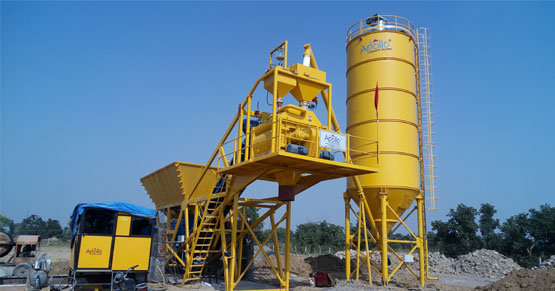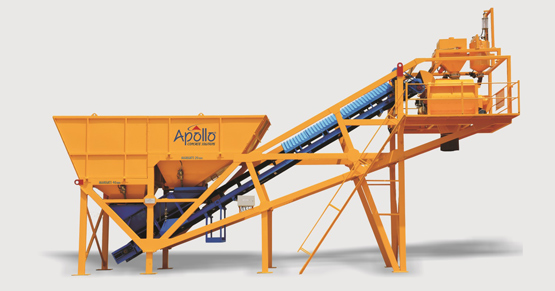Table of Contents
Infrastructure development in rural India is critical to bridging the urban-rural divide. From road connectivity to irrigation systems, rural projects often require durable and efficient construction materials to meet their unique challenges.
Economic Series concrete batching plants have emerged as a vital solution, offering flexibility, efficiency, and cost-effectiveness for infrastructure projects in remote areas. This article delves into the role of economic series concrete batching plants, their advantages, and their impact on rural development.
The Importance of Concrete in Rural Infrastructure
Concrete is the backbone of modern infrastructure. Its versatility, strength, and durability make it the preferred material for:
- Road Construction: Rural roads often endure heavy wear due to agricultural vehicles and variable weather.
- Irrigation Channels: Concrete canals are essential for efficient water distribution.
- Bridges and Culverts: Durable concrete structures improve connectivity in rural areas.
- Public Buildings: Schools, hospitals, and community centers rely on concrete for longevity and safety.
What Are Economical Series Concrete Batching Plants?
An economical Series concrete batching plant is a portable unit designed to produce concrete directly at construction sites. Unlike stationary plants, these economical solutions can be easily transported and set up in remote locations, making them ideal for rural infrastructure projects.

Features of Mobile Concrete Batching Plants
1. Compact Design
Economical Series plants are designed for easy transportation, with components like mixers, aggregate bins, and conveyors integrated into a single unit.
2. Quick Setup
Most Economical plants can be installed and operational within a two days, minimizing delays.
3. Versatility
They support various mix designs, catering to diverse project needs.
4. Automation
Modern plants include automated systems for precise material measurement and mixing, ensuring consistent quality.
The Role of Economical Concrete Solutions in Rural India
1. Addressing Accessibility Challenges
Rural areas often lack the infrastructure needed to transport ready-mix concrete from urban plants. Economical concrete solutions bring production to the site, eliminating logistical hurdles.
2. Reducing Costs
Transporting concrete over long distances can be costly. By producing concrete on-site, Economical plants significantly reduce transportation expenses.
3. Ensuring Timely Completion
Infrastructure projects in rural areas are often time-sensitive, particularly during favorable weather conditions. Economical series concrete batching plants expedite the construction process, ensuring timely completion.
4. Customization for Local Needs
Economical Series plants can be adjusted to produce concrete tailored to specific project requirements, such as higher durability for flood-prone regions.
Applications of Economical Series Concrete Batching Plants
1. Rural Road Construction
India aims to improve rural connectivity. Mobile plants provide on-site concrete for constructing durable roads, ensuring better access to markets, schools, and healthcare.
2. Irrigation Projects
Concrete-lined irrigation channels minimize water loss, enhancing agricultural productivity. Economical plants enable the cost-effective production of high-quality concrete for such projects.
3. Renewable Energy Projects
Solar and wind farms in rural areas require robust concrete foundations for their equipment. Economical Series concrete mixing plants ensure the production of precision-engineered concrete for these installations.
4. Public Infrastructure
Building centers, schools, and healthcare facilities in remote areas benefit from the flexibility and efficiency of Economical plants.
Advantages of Economical Series Concrete Batching Plants
1. Portability
The ability to move plants between sites makes them ideal for multiple small-scale projects in different locations.
2. Efficiency
By producing concrete on-site, mobile plants eliminate delays caused by transportation and ensure a steady supply.
3. Cost-Effectiveness
Reduced transportation costs, minimal material wastage and optimized resource usage contribute to overall cost savings.
4. Consistent Quality
Automation ensures that concrete mixes meet the required specifications, enhancing the durability of structures.
5. Sustainability
Economical plants support sustainable construction by minimizing emissions associated with transporting concrete over long distances.

Economical Series Concrete Plant Manufacturers and Suppliers in India
India’s construction boom has led to the growth of economical series concrete batching plant manufacturers and suppliers who offer innovative solutions tailored to local needs.
Key Manufacturers
- Local Expertise: Indian manufacturers provide cost-effective plants designed for rural conditions.
- Customizable Options: Machines can be tailored to produce concrete for specific applications, such as irrigation or road construction.
- After-Sales Support: Comprehensive services, including installation, training, and maintenance, ensure uninterrupted operations.
Suppliers
Reliable concrete batching plant suppliers maintain a steady inventory, ensuring timely delivery to construction sites.
Technological Advancements in Concrete Batching Plants
1. IoT Integration
Smart sensors and IoT-enabled systems monitor plant operations in real time, enhancing efficiency and reducing downtime.
2. Energy Efficiency
Modern plants incorporate energy-efficient components, minimizing operational costs and environmental impact.
3. Automated Control Systems
User-friendly control panels automate material measurement, mixing, and discharge processes, ensuring accuracy and consistency.
4. Compact and Modular Designs
Advanced designs reduce the plant’s footprint, making it easier to transport and install in constrained spaces.
Challenges in Implementing Economical Series Concrete Solutions
1. High Initial Investment
While cost-effective in the long run, the upfront cost of economical Series concrete batching plants can be a barrier for small contractors.
2. Skilled Workforce
Operating modern plants requires technical expertise, which may not always be available in rural areas.
3. Infrastructure Constraints
Transporting heavy machinery to remote locations with poor road connectivity can be challenging.
Solutions to Overcome Challenges
1. Financial Assistance
Subsidies and loans for rural infrastructure projects can help contractors invest in economical concrete batching plants.
2. Training Programs
Manufacturers and suppliers can provide training to local operators, ensuring efficient use of equipment.
3. Portable Designs
Compact and mobile designs minimize logistical challenges, enabling easy transportation and installation.
Future Trends in Mobile Concrete Solutions
1. Sustainability
Mobile plants are adopting green technologies, such as solar power and recycled materials, to align with eco-friendly construction practices.
2. AI and Automation
Artificial intelligence is enhancing predictive maintenance, optimizing production, and ensuring consistent quality.
3. Expansion in Emerging Markets
As rural infrastructure development gains momentum in India and other developing nations, the demand for economical concrete solutions is set to grow.
4. Integration with Renewable Energy Projects
The role of economic plants in constructing renewable energy infrastructure will expand, supporting India’s transition to clean energy.
Conclusion
Economical Series concrete batching plants are revolutionizing infrastructure development in rural India. Their portability, efficiency, and cost-effectiveness make them an ideal solution for diverse construction needs, from roads and irrigation systems to renewable energy projects.
By embracing advanced technology and sustainable practices, Economic Series concrete batching plant manufacturers and suppliers are playing a pivotal role in driving rural development. As India continues its journey toward inclusive growth, these mobile solutions will remain integral to building a robust and connected rural infrastructure.
Read More Articles on Concrete Batching Plant
Table of Contents


